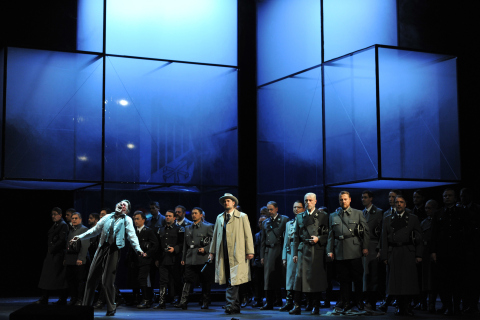In today’s Wall Street Journal “Sightings” column I reflect on two recent opera productions, one modern and the other postmodern. Here’s an excerpt.
* * *
The Metropolitan Opera recently presented a three-performance run of “Dialogues of the Carmelites,” Francis Poulenc’s 1957 opera about a group of nuns who were guillotined in the French Revolution. It was a revival of John Dexter’s 1977 production, not a new staging, but I didn’t hear anyone complaining. Mr. Dexter’s “Dialogues” is universally regarded by connoisseurs as one of the Met’s greatest theatrical achievements….
In a way, “Dialogues” is a kind of operatic time capsule. Long an international byword for artistic conservatism, the Met was notoriously slow to embrace contemporary stagecraft. Not so the modern-minded Mr. Dexter, who had become the company’s director of productions in 1974 and was endeavoring to update its creaky style. The stark, monumental-looking set for “Dialogues,” which was designed by the late David Reppa, was a slap in the face to old-fashioned operagoers who preferred big, fancy sets with imitation trees. Today it looks classic…
 I thought of the Met’s “Dialogues” when I read about Burkhard C. Kosminski’s recent Deutsche Oper am Rhein production of Richard Wagner’s “Tannhäuser,” a postmodern staging that was set in the Nazi era. Yes, there were gas chambers, and yes, the public was so scandalized that the company responded by scrapping the production….
I thought of the Met’s “Dialogues” when I read about Burkhard C. Kosminski’s recent Deutsche Oper am Rhein production of Richard Wagner’s “Tannhäuser,” a postmodern staging that was set in the Nazi era. Yes, there were gas chambers, and yes, the public was so scandalized that the company responded by scrapping the production….
Not having seen Mr. Kosminski’s “Tannhäuser,” I can’t say whether it was any good or not. Nor am I reflexively averse to productions of the classics that seek to update them in provocative ways. (The funniest “As You Like It” that I’ve ever seen, Kurt Rhoads’ 2007 Hudson Valley Shakespeare Festival production, was mounted in the style of a bottom-of-the-bill B Western.) But I’ve suffered through more than enough second- and third-rate postmodern opera stagings to be suspicious of any director who thinks that it’s a smart idea to turn “Tannhäuser” into a Holocaust-themed exercise in Irony Lite….
What has always struck me about the Met’s staging of “Dialogues of the Carmelites,” by contrast, is its straightforward, unironic seriousness of tone. Messrs. Dexter and Reppa made no attempt whatsoever to superimpose an alien directorial concept on Poulenc’s tragic tale of martyrdom. Instead they used the visual language of modernism to tell the terrible tale of the Carmelite nuns in as direct and universal a way as possible–and 36 years after the fact, the results still look timelessly true….
* * *
Read the whole thing here.
Terry Teachout on the arts in New York City
